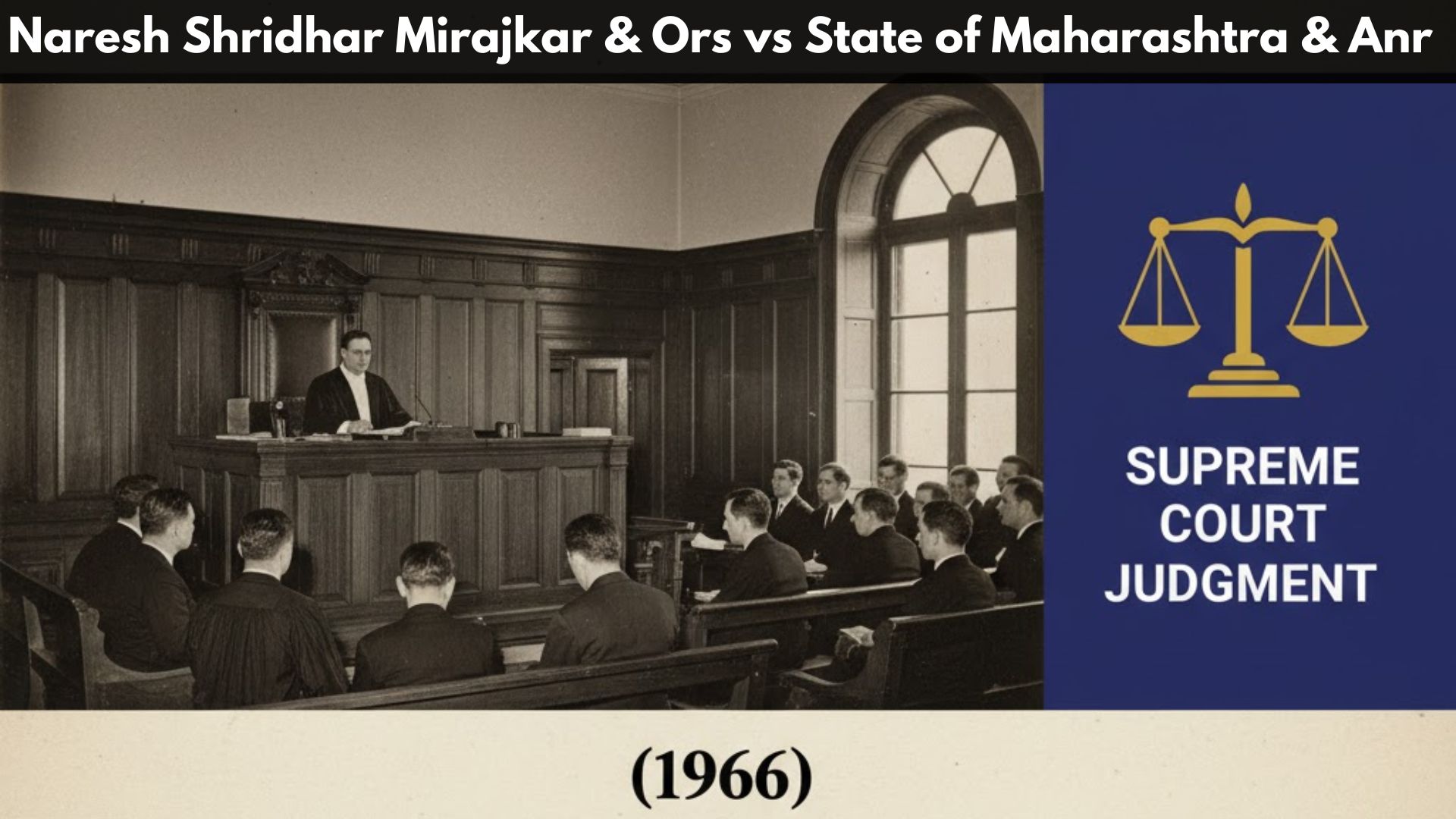
Case Summary: Naresh Shridhar Mirajkar & Ors vs State of Maharashtra & Anr (1966)
Case Stats
(1966) 03 SC CK 0009
Name of the Court: Supreme Court of India
Case No: Writ Petition Nos. 5, 7, 8, 9 of 1965
Date of Decision: 03-03-1966
Bench: Full Bench
Hon'ble Judges: P. B. Gajendragadkar, C.J; V. Ramaswami, J; S. M. Sikri, J; R. S. Bachawat, J; M. Hidayatullah, J; K. N. Wanchoo, J; J. C. Shah, J; J. R. Madholkar, J; A. K. Sarkar, J
Advocates: N.C. Chatterjee; R.K. Garg; S.C. Agrawal; D.P. Singh; M.K. Ramamurthi
Final Decision: Dismissed
[Judgment Source]
https://www.courtkutchehry.com/Judgement/Search/AdvancedV2?docid=282776
All Citations
AIR 1967 SC 1; (1966) 3 SCR 744
Facts of the Case
The case arose when a Bombay High Court Judge orally directed that the evidence of a witness (Bhaichand Goda) in a defamation suit should not be published in the press, following the witness's request to avoid business loss. Reporters from 'Blitz' and other publications challenged this order as violating their fundamental rights under Articles 19(1)(a) (freedom of speech) and 19(1)(g) (freedom of occupation). The Bombay High Court dismissed their writ petitions, holding the order to be a judicial act not amenable to Article 226 jurisdiction. The petitioners moved the Supreme Court under Article 32.
Law Points Raised
1) Whether a judicial order of a High Court can be challenged under Article 32 for violation of fundamental rights.
2) Whether the oral order prohibiting publication violated Articles 19(1)(a) and 19(1)(g).
3) Scope of 'reasonable restrictions' under Article 19(2) to protect administration of justice.
4) Extent of inherent powers of a court to control publicity of proceedings.
5) Whether fundamental rights can be enforced against judicial orders.
Acts / Provisions / Articles Referred
• Constitution of India — Articles 17, 19(1), 20(1), 21, 22, 23, 24, 32, 226
• Indian Official Secrets Act, 1923 — Section 14
• Hindu Marriage Act, 1955 — Section 22(1)
• Code of Criminal Procedure, 1898 — Sections 30, 352
• Code of Civil Procedure, 1908 — Section 151, Order 39 Rule 1
• Indian Penal Code — Sections 143, 366
• Specific Relief Act, 1877 — Section 54
Judgments Referred
• In re: P.C. Sen (1966)
• Attorney-General v. Leveller Magazine Ltd. (UK)
• Scott v. Scott (UK HL)
• Various precedents on open justice and exceptions to it.
Obiter Dicta
The Court emphasized that while open justice is a fundamental principle, exceptions exist to protect the administration of justice, witnesses, and fair trial. Inherent powers of superior courts include regulating publicity in proceedings where justice demands confidentiality.
Ratio Decidendi
A judicial order of a superior court cannot be challenged under Article 32 solely on the ground of violation of fundamental rights. The oral order was within the inherent powers of the High Court to ensure justice and was a reasonable restriction under Article 19(2).
Final Ruling
Petitions dismissed. The impugned oral order was held valid as a judicial act of the High Court, falling within its inherent powers and constituting a reasonable restriction on press freedom to safeguard the administration of justice.
Summary
This landmark case affirmed that judicial orders of superior courts are not subject to direct challenge under Article 32 for breach of fundamental rights. It recognized the inherent power of courts to restrict publicity to protect justice, holding that such restrictions, if reasonable, are constitutionally valid under Article 19(2).
[Judgment Source]
https://www.courtkutchehry.com/Judgement/Search/AdvancedV2?docid=282776